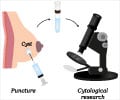Scientists have found how gene expression that contributes to drug resistance is ramped up in unusual types of breast tumours.

Approximately 70 percent of breast cancers express the estrogen receptor. These "ER-positive" tumors usually respond to hormone-related therapies, such as tamoxifen or aromatase inhibitors. But not always.
"We were interested in a subset of ER-positive tumors that are unusually aggressive and also drug-resistant," said Jonna Frasor, assistant professor of physiology and biophysics at the UIC College of Medicine and principal investigator of the study.
Following up on earlier observations that these aggressive ER-positive tumors express genes that respond both to estrogen and inflammatory factors called cytokines, Frasor and her colleagues focused on the gene for a drug-transporter protein which is believed to pump chemotherapy drugs out of tumor cells, making them resistant.
It is unexpected to find estrogen and inflammatory proteins seemingly working together to drive the cancer's aggressiveness, says Madhumita Pradhan, a student in Frasor's lab and first author of the paper.
In many cases, estrogen is known to be protective against inflammatory processes, Pradhan said.
Advertisement
An area on a gene called a promoter acts as an on/off switch that determines whether the gene is transcribed and the protein it encodes is produced. The promoter has spaces called response elements, where molecules can attach and help to turn the switch on or off.
Advertisement
This novel mechanism could have important implications in the treatment of breast cancers in which inflammation and estrogen can promote cancer progression, said Frasor.
The study is published in the Journal of Biological Chemistry, where it is designated a paper of the week.
Source-ANI












